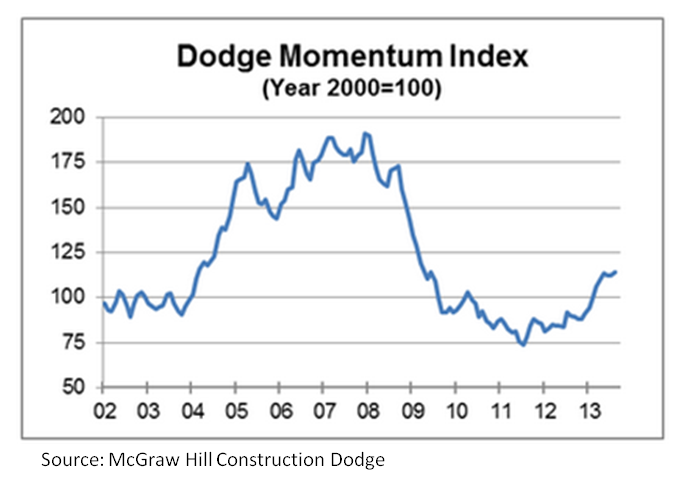Market Data

January 14, 2014
DMI for Nonresidential Building Gains 1.2% in December
Written by Sandy Williams
The Dodge Momentum Index is a monthly measure of the initial report for nonresidential building projects in planning and is published by McGraw Hill Construction. The report leads construction spending by a full year and can be used an indicator for future construction. Any reading above 100, established for year 2000, indicates growth in construction planning.
The Momentum Index for December rose 1.2 percent to 118.3 from the previous month with both commercial and institutional buildings driving the increase. The index for commercial building rose 1.5 percent to a reading of 112.3 due to office and hotel developments. New projects revealed in December include a $350 million office campus in California, a $300 million office tower in Boston, and a $94 million expansion of a Microsoft data center in Quincy, Washington.
Institutional planning activity gained 0.8 percent, registering 125.7 on the Index, mostly due to education-related building including projects at university and training facilities in Ann Arbor, Mich., South Carolina, and Dearborn, Mich.
Looking at the last five months, nonresidential planning activity took a dip in October but has been on a modest upward trend since then.
{amchart id=”125″ Dodge Momentum Index}
If you look at the yearly Momentum Index chart there is been an upward trend throughout 2013 after an erratic year in 2012 that roughly parallels the Architectural Billings Index, a report that looks at inquiries for design services for nonresidential building projects. Although construction for residential housing has showed strong growth in 2013, nonresidential construction continues to drag.

{amchart id=”64″ AIA ABI Index}







